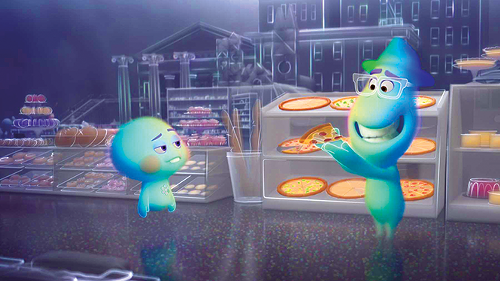The One Thing
Soul tells a fantastical tale about the complicated path toward finding one's calling.
By Scott Renshaw @scottrenshawIn the popular 1991 comedy City Slickers, Jack Palance's taciturn trail boss Curly shares his bit of life wisdom with Billy Crystal's mid-life-crisis-afflicted Mitch with a simple raised index finger. It was meant to represent that one thing, the single thing that gives your life a purpose and a meaning. And as well-intended as Curly's simple philosophy might have been, that's exactly the kind of reductive nonsense that Soul wants to take a swipe at.
The Pixar features directed by the animation studio's current chief creative executive, Pete Docter—including Up and Inside Out—have long been some of their most emotionally resonant works, using fantastical worlds as the backdrop for rich stories about making peace with a life different from the one you expected. Soul journeys down that same road, and still finds more to share about hard-won lessons in finding happiness in previously unexpected places.
The set-up, naturally, places those ideas in an unusual setting—eventually. We're first introduced to Joe Gardner (Jamie Foxx) in a middle-school music room, struggling to teach (mostly) bored band students. It's not his dream job, as it becomes clear when he cringes at bing offered a full-time position at last; he really wants a career as a jazz pianist, which has never quite come together for him. Then, on the day when he lands a potentially life-changing gig with a celebrated singer (Angela Bassett), his life changes in another way: He falls down an open manhole, and finds himself on the way to the afterlife.
He does, however, find a way to make a detour from obliteration—into the before-life. That's where Joe finds himself assigned as mentor to Soul 22 (Tina Fey), who has spent thousands of years resisting the opportunity for a mortal existence. That's also where Docter and company are able to go wildest with the visual imagination, fashioning the realm of unborn souls into a mix of puffy clouds and sharp angles, particularly those on the two-dimensional cubist figures who run the place, and all take the name of Jerry. It's a nifty little universe—and the place where Soul serves up many of its joke-iest references to earthly life—but one of the film's most intriguing surprises is how little time it spends there.
And that's because Soul is clearly and resolutely about our time here on this planet, even if it employs a well-worn "body swap" concept to do so. Joe and Soul 22 both end up in physical bodies, but it's Soul 22 who ends up in Joe's body, and Joe in that of a cat. Plenty of action and comedy is built into that mismatch, but Docter and his co-writers—Mike Jones and co-director Kemp Powers—know precisely when to switch gears and explore what it actually means to have a "calling." Joe initially misunderstands his mission as a soul mentor as helping Soul 22 find its One True Purpose as a human, because that's the way he misunderstands his own life. One of Soul's neatest tricks is the way it refuses to underline the possibility that Joe's focus on what he believes is his One True Purpose hasn't allowed him to appreciate the fact that he might have more than one calling.
Soul takes yet another turn in trying to tackle the messaging from authority figures that can crush people's dreams before they even have a chance to try, which admittedly jumbles things up a bit. There are moments during that detour when it feels like the narrative is drifting in the direction of a message like "don't stop people from following their dreams," when that's not exactly the point here. The kind of heart-rending emotional moment you might expect from Pixar's best doesn't emerge in the same way, nor are most of the vocal performances as indelible, so it never quite reaches that highest bar Pixar has set for itself. But it's valuable enough if the kids who watch it absorb the notion that being alive is its own kind of calling, and that there's no need to limit its value or purpose by believing it's all about [holds up index finger] one thing.
More by Scott Renshaw
-
Film Reviews: New Releases for April 19
The Ministry of Ungentlemanly Warfare, Abigail, The Beast, Hard Miles, Sasquatch Sunset and more
- Apr 19, 2024
-
Faces of Salt Lake County book and portrait reception
Images and personal stories in a new book reveal local demographic diversity
- Apr 17, 2024
-
Feature film review: THE BEAST
A filmmaker's compelling ideas get a bit tangled in references to his creative influences.
- Apr 17, 2024
- More »
Latest in Film Reviews
Readers also liked…
-
Power Plays
Two satirical comedies explore manipulations and self-delusions by those with power.
- Aug 31, 2022




